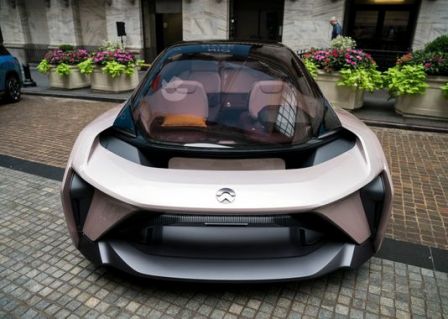China is key to the future of electric vehicles because of formidable innovation and global reach as much as biggest market demand.
The new IDTechEx Research report, “Electric Vehicles in China 2019-2029”, finds that the market penetration and technical innovation in China of electric buses is more impressive than electric cars.
 However, it finds that China is extremely backward in certain respects and its success and priorities are not always those that the global media portray. For example, Chinese companies in China make robot agricultural tractors and shuttles and have the endurance record for a solar plane in the upper atmosphere.
However, it finds that China is extremely backward in certain respects and its success and priorities are not always those that the global media portray. For example, Chinese companies in China make robot agricultural tractors and shuttles and have the endurance record for a solar plane in the upper atmosphere.
The Chinese have licensed solar car technology to the Germans and French and exported large supercapacitor buses to many countries while many foreign manufacturers still believe the only choice is a battery. Mostly, the government support for EV manufacture and demand is highly intelligent and successful and the moves abroad are shrewd. For example, the Geely Chairman has bought nearly 10% of Daimler for $9 billion, becoming it the largest shareholder. Funding is kept obscure but believed to be controlled by the Chinese state.
In EVs, China is the land of opportunity. Spotting gaps in the market, Tesla is setting up production in China. The report cautions that, even with 99% of installed pure electric buses in the world, China still makes two diesel buses for every electric one. It still builds coal fired power stations to provide EV electricity. There has never been support to electrify one million polluting old school buses, mostly unauthorised ones, but IDTechEx predicts a date fairly soon when their upfront cost in electric form will match that of conventional ones and sales will take off.
Performance comparisons of different EVs in China – land, water and air – and battery specifications and suppliers are summarised inthis report’s information-packed pages. Understand why e-trucks will become a huge business in China and large pure electric refuse trucks are already exported. Learn how Chinese companies, often with smart Chinese government backing, are continuing to buy brands, routes to market and advanced technology abroad. The new data IDTechEx has gathered, using its multi-lingual PhD level analysts, make it optimistic about Chinese leadership in solar roads and drones and deployment of hub motors for example. Discover which type of off-road EV will sell in and from China at three times the volume of electric bikes.
China is catching up in robotics and software-controlled fleets and vehicle updates. It needs to do better in power electronics, high energy density supercapacitors, structural electronics and other identified aspects. With EV batteries becoming smaller soon due to top up charging at speed and other innovations, some Chinese gigafactories may become stranded assets. When? Understand how Chinese EV components will succeed hugely abroad and damage the business of traditional western Tier One suppliers insufficiently investing in R&D.
Electric Vehicles in China 2019-2029 embraces 51 companies. The 34 page “Executive Summary and Conclusions” reveals newinfograms, tables and graphs and detailed forecasts 2019-2029. For instance, one table of 70 EV sectors land, water and air reveals where China is in the lead in sales or technology. They give rapid insight into good and bad EV sectors in China, largest manufacturers, export and import gaps in the market, technology trends and tools for prediction. Emphasis is on distilled information with many conclusions and predictions.
The Introduction to the report then examines land, water and particularly air pollution being addressed, congestion, vehicle specifications and evolving capability in China and why certain vehicles are favoured by the government. Regulatory, reuse, recycling and traceability in China are covered including national plans and regulations for battery improvement and recycling.
Chapter 3 concerns small EVs in China – 2 and 3 wheel and car-like vehicles with important new derivatives. It embraces market slowdowns, restrictions and growth opportunities. Chapter 5 summarises the electric car situation in China with examples of sales and technology leadership by company.
Chapter 4 is more detailed on the large activity in buses and, in future, trucks and their batteries, the largest component cost for now. Here you find costing and powertrain evolution. Learn of the fuel cell vehicle strategy and initiatives and supercapacitor buses and trucks eliminating traction batteries. See negligence and innovation with buses and trucks. Chapter 6 profiles leaders BYD and Yutong in a critical but balanced manner. IDTechEx describes them as successful opposites with both having big challenges and opportunities ahead.



